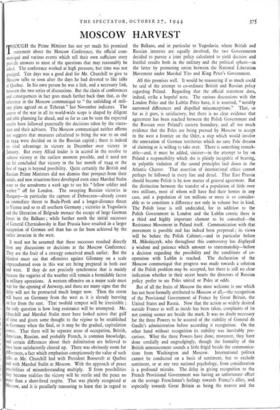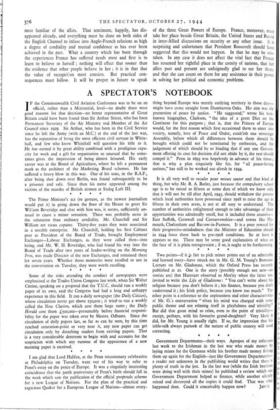MOSCOW HARVEST
WHOUGH the Prime Minister has not yet made his promised I statement about the Moscow Conference, the official com- muniqué and various events which tell their own sufficient story provide answers to most of the questions that may reasonably be asked. The conference worked at high pressure, but time was not grudged. Ten days was a good deal for Mr. Churchill to give to Moscow talks so soon after the days he had devoted to like talks at Quebec. In his own person he was a link, and a necessary link, between the two series of discussions. But the chain of conferences and consequences in fact goes much farther back than that, as the reference in the Moscow communiqué to "the unfolding of mili- tary plans agreed on at Teheran" last November indicates. The course of the war in all its world-wide scope is shaped by diligent and able planning far ahead, and so far as can be seen the expected results have followed punctually the decisions taken by the states- men and their advisers. The Moscow communiqué neither affirms nor suggests that measures calculated to bring the war to an end in 1944 were decided on in the Russian capital ; there is indeed no vital advantage in victory in December over victory in January. But every Allied leader is in accord in the resolve to achieve victory at the earliest moment possible, and it need not yet be concluded that victory in the last month of 1944 or the first of 1945 is beyond possibility. Quite certainly the British and Russian Prime Ministers did not dismiss that prospect-from their minds, and new situations have developed even since Marshal Stalin went to the aerodrome a week ago to see his "fellow soldier and worker" off for London. The sweeping Russian victories in Hungary—in particular the capture of Debreczen—already create an immediate threat to Buda-Pesth and a longer-distance threat to Vienna and so to all southern Germany ; victories in Yugoslavia and the liberation of Belgrade menace the escape of large German forces in the Balkans ; while further north the initial successes of General Chemiakovsky in East Prussia have resulted in a larger occupation of German soil than has so far been achieved by the earlier invasion in the west.
It need not be assumed that these successes resulted directly from any discussions or decisions at the Moscow Conference. They are the fruit of a strategy conceived much earlier. But the blindest must see that offensives against Germany on a scale unprecedented even in this war are being prepared in both east and west. If they do not precisely synchronise that is mainly because the vagaries of the weather still remain a formidable factor in military operations. A western offensive on a major scale must wait for the opening of Antwerp, and there are many signs that the delay will not be protracted much longer now. Then the storm will burst on Germany from the west as it is already bursting on her from the east. That twofold tempest will be irresistible ; the only question is how long resistance will be attempted. Mr. Churchill and Marshal Stalin must have looked across that gulf of time and given some thought to the regime to be established in Germany when the final, or it may be the gradual, capitulation comes. That there will be separate areas of occupation, British, American, Russian, and probably French, is common knowledge, and certain differences about their delimitation are believed to have been satisfactorily cleared up. There was obviously room for differences, a fact which emphasises conspicuously the value of such talks as Mr. Churchill had with President Roosevelt at Quebec and with Marshal Stalin at Moscow. With the approach of peace Possibilities of misunderstanding multiply. If from possibilities they become realities the victory will be sterile and the peace no more than a short-lived respite. That was plainly recognised at Moscow, and it is peculiarly reassuring to learn that in regard to the Balkans, and in particular to Yugoslavia, where British and Russian interests are equally involved, the two Governments decided to pursue a joint policy calculated to yield decisive and fruitful results both in the military and the political sphere—in the latter by promoting union between the National Liberation Movement under Marshal Tito and King Peter's Government.
All this promises well. It would be reassuring if as much could be said of the attempt to co-ordinate British and Russian policy regarding Poland. Regarding that the official statement does, indeed, strike a hopeful note. The various discussions with the London Poles and the Lublin Poles have, it is asserted, "notably narrowed differences and dispelled misconceptions." That, so far as it goes, is satisfactory, but there is no clear evidence that agreement has been reached between the Polish Government and the Russian over Poland's eastern boundary, and all too much evidence that the Poles are being pressed by Moscow to accept in the west a frontier on the Oder, a step which would involve the annexation of German territories which no sane Pole dreams of claiming or is willing to take over. There is something remark- able—and, it must be added, sinister—in the attempt to lay on Poland a responsibility which she is plainly incapabk of bearing, in palpable violation of the sound principles laid down in the Atlantic Charter. That assertion of international ethics cannot perhaps be followed in every line and detail. That East Prussia should become Polish is by now matter of general agreement. But the distinction between the transfer of a population of little over two millions, most of whom will have fled their homes in any case, and a population of ten millions or more is so consider- able as to constitute a difference not only in volume but in kind. The Polish issue is still undecided, for in addition to the Polish Government in London and the Lublin coterie there is a third and highly important element to be consulted—the Resistance Movement in Poland itself. Communication with that movement is possible and has indeed been perpetual ; its views will be before the Polish Cabinet,—and in particular before M. Mikolajczyk, who throughout this controversy has displayed a wisdom and patience which amount to statesmanship—before a decision regarding the possibility and the conditions of co- operation with Lublin is reached. The declaration of the Moscow communiqué that progress was made towards a solution of the Polish problem may be accepted, but there is still no clear indication whether in their secret hearts the directors of Russian policy prefer to see Poles united or Poles at odds.
But of all the fruits of Moscow the most welcome is one which has not been formally attributed to Moscow at all,—the recognition of the Provisional Government of France by Great Britain, the United States and Russia. Now that the action so widely desired outside France as well as inside has been taken, complaints of its not coming sooner are beside the mark. It was no doubt necessary for the three Powers to be assured of the stability of General de Gaulle's administration before according it recognition. On the other hand without recognition its stability was inevitably pre- carious. What the three Powers have done, moreover, they have done cordially and ungrudgingly, though the formality of the British announcement sounds a little frigid beside the communica- tions from Washington and Moscow. International politics cannot be conducted on a basis of sentiment, but to exclude sentiment, or at any rate national psychology, from consideration is a profound mistake. The delay in giving recognition to thc French Provisional Government was having an unfortunate effect on the average Frenchman's feelings towards France's allies, and. especially towards Great Britain as being the nearest and the most familiar of the allies. That sentiment, happily, has dis- appeared already, and everything must be done on both sides of the English Channel to infuse into Anglo-French relations as high a degree of cordiality and mutual confidence as has ever been achieved in the past. What a country which has been through the experiences France has suffered needs most and first is to learn to believe in herself ; nothing will effect that sooner than the evidence that other people believe in her ; it is in that that the value of recognition most consists. But practical con- sequences must follow. It will be proper in future to speak of the three Great Powers of Europe. France, moreover, must take her place beside Great Britain, the United States and Russia in inter-Allied discussions on security or any other issue. It is surprising and unfortunate that President Roosevelt should have suggested that this would not happen. In that he may be mis- taken. In any case it does not affect the vital fact that France has resumed her rightful place in the comity of nations, that her allies past and present are unfeignedly glad to see her there, and that she can count on them for any assistance in their power in solving her political and economic problems



























 Previous page
Previous page